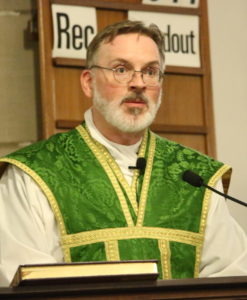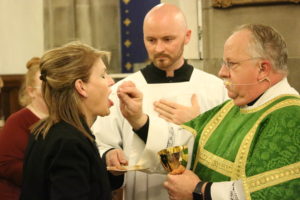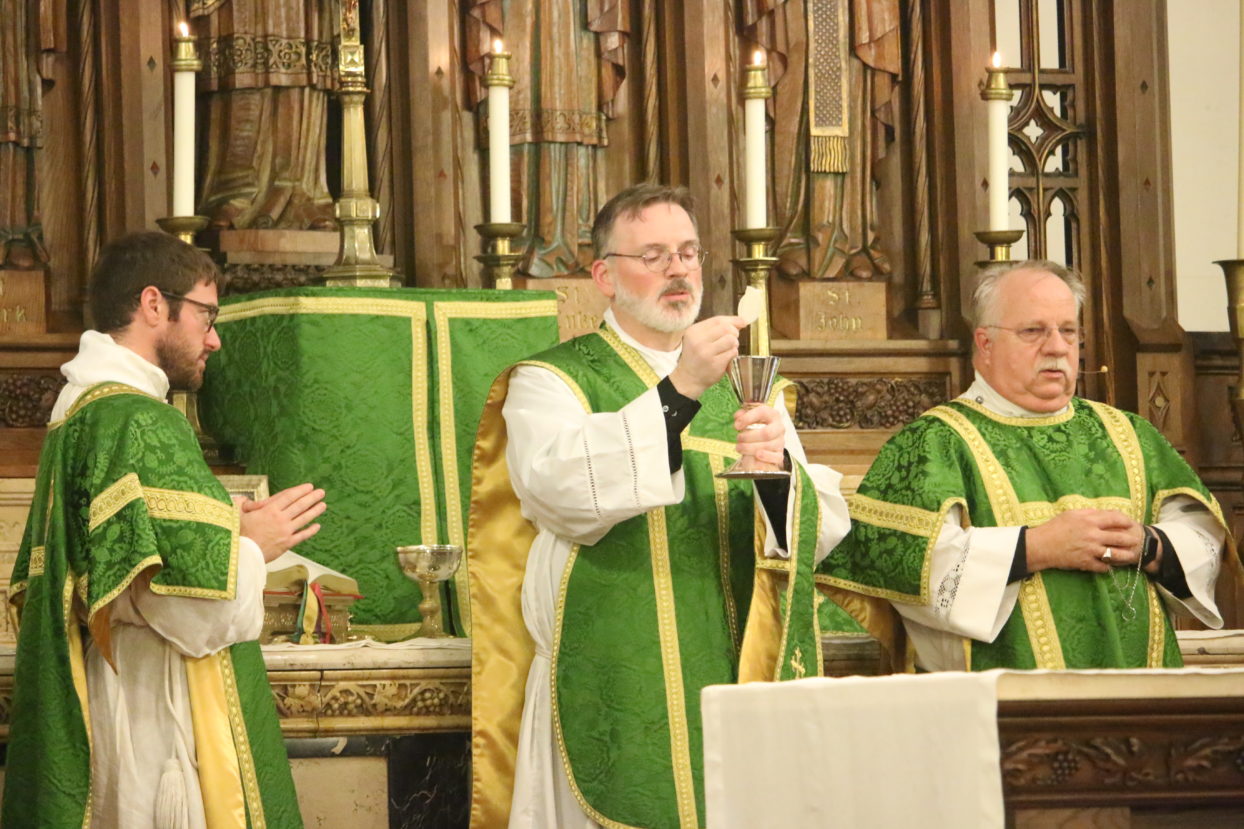Ordinariate Mass brings into full communion those people who are in other ecclesial communities
By Dan McWilliams
An Ordinariate Mass held at Holy Ghost Church in Knoxville was the first of its kind celebrated in East Tennessee: a liturgy in English that also featured the incense, solemnity, and ad orientem worship usually associated with the extraordinary form.
Father Rick Kramer, moderator of the curia and director of vocations and clergy formation for the Personal Ordinariate of the Chair of St. Peter, was the principal celebrant and homilist for the Oct. 24 Mass. The ordinariate, which is equivalent to a diocese, was established by Pope Emeritus Benedict XVI in 2012 for people nurtured in the Anglican tradition who were becoming Catholic. Parishes and communities in the ordinariate are fully Roman Catholic while retaining elements of the English/Anglican patrimony in their liturgy, hospitality, and ministries. The Chair of St. Peter has more than 40 Roman Catholic parishes and communities across the United States and Canada.
Concelebrating the Mass at Holy Ghost were host pastor Father Bill McNeeley and associate pastor Father Michael Hendershott. Father McNeeley, a former Episcopal priest, came into the Catholic Church through the Pastoral Provision established by Pope St. John Paul II; he was ordained for the Diocese of Knoxville in 2007.
“I’m grateful to Father McNeeley and the good people of Holy Ghost to be able to provide this,” said Bishop Richard F. Stika. “If it uplifts people in a spiritual sense, it’s a good thing.”
Father Kramer introduced himself at the start of his homily.

Father Rick Kramer, moderator of the curia and director of vocations and clergy formation for the Personal Ordinariate of the Chair of St. Peter
“We are a diocese that was created by Pope Benedict XVI to foster the full visible, corporate communion between Anglicans and Protestants with the full communion of the Catholic Church,” he said. “It is a great joy for me to be here today. My office is in Houston, Texas. I am so happy to be able to celebrate this Ordinariate Mass, or this Mass according to Divine Worship, our missal, with all of you. Father McNeeley, I especially thank you for the invitation to come here to Knoxville this evening.”
Speaking after Mass, Father Kramer said he journeyed from the Episcopal priesthood to the Catholic Church “by God’s grace.”
“It is a bit of a long story. I converted in 2005 together with my family. We all came in together,” he said. “In 2009, the Holy Father, Pope Benedict XVI, promulgated an apostolic constitution, Anglicanorum coetibus, which made it possible for those of us who were journeying into the fullness of communion with the Church to retain some of the customs and traditions that truly belonged to the Catholic Church but flourished within Anglicanism. So we got to bring those, and you see that expressed in this Mass.”
The Ordinariate Mass resembled an extraordinary-form Mass, or Latin Mass, in that the priests and the assembly both faced the same direction, liturgical east, when addressing the Lord.
“It’s identifiably Catholic. It’s identifiably a Mass,” Father Kramer said.
Several parts of the Mass were Anglican in origin.
“There are a couple of pieces you heard this evening. The prayer at the very beginning is called the Collect for Purity—that’s a little bit different than is found in the Roman Missal,” Father Kramer said. “Then we also have within the Mass itself our version of the Confiteor, the penitential rite. We also heard the Prayer of Humble Access, and then that prayer of thanksgiving after Mass, right before the post-Communion prayer—those are some of the big components that are brought in.”
The main purpose of the ordinariate was “to bring into full communion those people who are in other ecclesial communities . . . and make a way for us to share the treasures that we received that made us think about the Catholic Church,” Father Kramer said.
Regarding those weighing the option to convert to Catholicism, Father Kramer said, “My response to that is, when you know the truth, you have to make a decision.”
Father McNeeley said Holy Ghost was “just trying to create a welcoming environment for Protestants, homeless former Anglicans, Methodists—people who are looking to come to the Catholic Church. As it was with me, a lot of people feel that their church has left them. It’s like I was in the year 2000—I could no longer recognize the church I was raised in. This is just kind of setting out a welcome mat for people looking for a church home and makes it a little easier because it’s oftentimes a liturgy that they’re a little more familiar with.”
Father Hendershott called the Ordinariate Mass “a beautiful liturgy of a vision of our Pope Emeritus Benedict for reconciliation with those who have been estranged from the one holy Catholic and apostolic Roman Church, to find unity. It seems also a bit of an opportunity for Roman Rite Catholics to see a Mass that looks a little bit like the Mass that was before the Second Vatican Council.”
In a question-and-answer session downstairs in Holy Ghost’s Henkel Hall after Mass, Father Kramer talked of Pope Benedict’s establishment of three ordinariates: in the United States, England, and Australia.
“He established the ordinariates as a really incredibly generous response that only the Church can give to people like myself who were former Episcopalians but were asking to come into the fullness of the Catholic Church, who were so moved in our own lives to consider the Catholic Church because of the prayers we had prayed and the life of spirituality that we had developed as Anglicans,” Father Kramer said.

Father Bill McNeeley, pastor of Holy Ghost Parish and a former Episcopal priest, gives Communion to a Catholic who was attending the Ordinariate Mass at Holy Ghost on Oct. 24. Pope Emeritus Benedict XVI established the ordinariate in 2012.
“Pope Francis has in a sense, through the complementary norms that we have, sort of expanded our mission a little bit from just Anglicans to incorporate those who were formed in any ecclesial community outside of the Church. That could include Baptists. That could include Presbyterians or Lutherans or people from other Protestant denominations who are seeking to come into the fullness of the Church. This is a beautiful moment in the life of the Church to be able to raise up awareness of the Church’s beautiful teaching. I’m saying ‘beautiful’ often right now, because if you’re like me, traveling into the Church, you truly discover the beauty of all that the Church holds in her teaching and how loving it is to finally receive clarity in this word of truth that we’re given.
“In a world that is confused, in a world that is in darkness where so many are losing their way, what a great opportunity we have right now to be working for Christian unity in the Church, for it’s by our unity that the message of the Gospel is made credible and believable. And others will see it, and we pray God will follow our example in the way that we have led.”
Leaving familiar church settings for another tradition can be a cross to bear, Father Kramer noted.
“The way of discipleship always entails the cross, and so it’s not easy, but with God’s grace, with His love, He who carried the cross for all of us shows us the way to do it,” he said. “And it means that sometimes we have to leave behind the things that we thought we could take with us. It means sometimes we’ll lose friends. It means sometimes we have to say goodbye to family members to come into the fullness of the Church. Some of us had to give up jobs and livelihoods to try to just become Catholic and to live our lives as Catholics.”
Father Kramer discovered his true Church home when he did convert.
“I am so happy to have found the Church and to be able to live my life in the Church this way, and I am profoundly grateful to Pope Benedict XVI and Pope Francis, who have responded so generously to the requests of those of us seeking to come into the Church,” he said, “that we’re able to have a Mass like this tonight, where those words that formed us and shaped us in our faith can now accompany us throughout our whole life of discipleship as Catholics and continue to give life to the Church and be vibrant aspects of our life in the Church today.”
Father Kramer thanked Bishop Stika, Father McNeeley, and Bishop Steven J. Lopes, who leads the Chair of St. Peter. Bishop Lopes recently became chairman-elect of the U.S. Conference of Catholic Bishops’ Committee on Divine Worship.
“I’m honored, I’m humbled to be here tonight, and I’m grateful for so many of you who have come out and who are sharing your own stories of coming into the Church and finding it home,” he said. “I want to especially thank Bishop Stika, who in response to Father’s invitation, graciously granted the request that we were able to come to celebrate this Mass here, and Bishop Lopes, who is leading the ordinariate right now and making the way for this to happen by allowing me to come tonight and celebrate this Mass and greet you in his name from the ordinariate. Especially those of you who are members of the ordinariate, I bring greetings to you from Bishop Lopes. I’d like to thank Father McNeeley for reaching out to us and asking in the first place and inviting us, Father McNeeley who himself and his family traveled this path into the Church.”
Father Kramer said that “we don’t hate the traditions we came from. It caused me real grief to leave the Episcopal Church when I did. I didn’t leave because I hated the Episcopal Church. I left because I wanted to be a Roman Catholic, and I knew that the Church had opened up a way for me to do that.”
Father McNeeley also spoke at the Q&A.
“It took me a long time to figure out I was Catholic,” he said. “We should be moving toward reunification. It is one Lord, one faith, one baptism, one God and Father of all. We should be moving toward that unity. When it became clear to me that there was going to be a liberal Episcopal Church and a conservative Episcopal Church and a halfway-in-between Episcopal Church and everything, I just said, ‘when push comes to shove, I’m Catholic.’
“That’s when the wall kind of came tumbling down, and I realized that God was calling me into true union. I learned that the only way you could be Catholic was to become a Catholic.”
Father McNeeley said “there are a number of homeless former Anglicans that don’t know that they’re Catholic yet.”
In his homily, Father Kramer talked about the day’s Gospel reading, which told the story of Jesus’ healing Bartimaeus of his blindness.
“In the context of the Lord’s healing of the blind man Bartimaeus, we see that in the new covenant, the prayer of faith is a chief characteristic of Christian life. It has been said that prayer is the living relationship of the children of God with our heavenly Father, offered through Jesus Christ and in the power of the Holy Spirit,” he said. “The plaintive words of the blind man Bartimaeus, ‘Jesus, son of David, have mercy on me,’ is a prayer that was received and developed in the early tradition of vocal prayer in the life of the Church. It is a simple but powerful prayer that has come to be known as the Jesus Prayer.
“The most usual form is made up of two parts: an address, ‘Lord Jesus Christ, Son of God,’ and a petition, ‘Have mercy on me, a sinner.’ . . . In its structure, the address of the Jesus Prayer identifies the Lord with a profession of faith. In the prayer of Bartimaeus, the title ‘Son of David’ is an acknowledgement that the Lord is the heir of David’s throne and therefore the promised one of God, who, Jeremiah said, is the one sent to restore gladness to His people, to gather them from the captivity of their exile that was the punishment for their faithlessness and sin. Here, just outside of Jericho, passing by along the way, is the long-awaited One, who was sent to give sight to the blind.”
The Jesus Prayer “can be the first prayer on our lips in the morning,” Father Kramer said. “It can be prayed throughout all the moments of our day, and it can be the last prayer on our lips at night to help us keep focused on the Lord as we seek to follow Him in the way. We can have this confidence and trust that Jesus always responds to the prayer offered in faith. Why, just look how this prayer got his attention. He remembers His mercy forever. He remembers that we are His little ones, and He is always ready to heal us and to help us. Therefore, let us keep our eyes fixed on Jesus, for ‘now we see through a glass darkly but then face to face.’”
Bishop Stika said there can be a role for the ordinariate in the Diocese of Knoxville.
“The beauty of the ordinariate, it’s kind of like things that have occurred over the last number of years with looking at the outreach that the Church can have for some of the communities that have separated from us,” he said. “One of the great quotes, I think it was John Paul, he talked about, this is more with the Orthodox, ‘the Church has to breathe with both lungs, the East and the West.’ Well, in some ways, this is kind of like that. . . . The [Chair of St. Peter] has taken some of the Anglican ritual and returned certain notions of it to make it more coincide with the Latin Rite Church. It’s kind of a combination of the old Mass and the new Mass in some ways. It’s a beautiful thing, and it’s just a way to bring people closer to Rome and to the Holy Father and his authority and jurisdiction.”
Father Kramer may have summed up his journey to the Catholic Church best at the Q&A.
“One of the things I like to say is, hands down, my worst day as a Roman Catholic is better than my best day anywhere else.”

